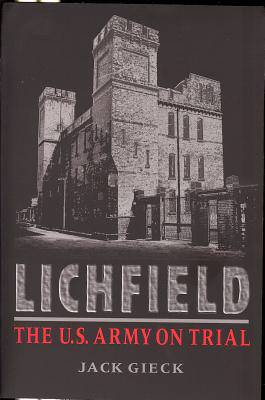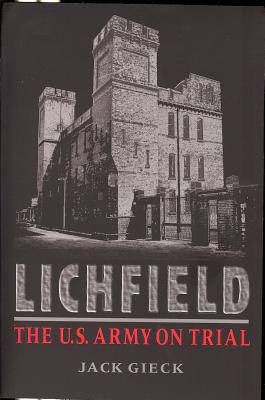
Bedankt voor het vertrouwen het afgelopen jaar! Om jou te bedanken bieden we GRATIS verzending (in België) aan op alles gedurende de hele maand januari.
- Afhalen na 1 uur in een winkel met voorraad
- In januari gratis thuislevering in België
- Ruim aanbod met 7 miljoen producten
Bedankt voor het vertrouwen het afgelopen jaar! Om jou te bedanken bieden we GRATIS verzending (in België) aan op alles gedurende de hele maand januari.
- Afhalen na 1 uur in een winkel met voorraad
- In januari gratis thuislevering in België
- Ruim aanbod met 7 miljoen producten
Zoeken
€ 23,95
+ 47 punten
Uitvoering
Omschrijving
As a young officer, Jack Gieck attended sessions of a military trial that could rival in dramatic intensity such films as A Few Good Men. Years later, still fascinated by this clash of strong personalities, these courtroom intrigues, he began the extensive research that led to this book. Lichfield: The U.S. Army on Trial chronicles a series of courts-martial held at the end of World War II, precipitated by events at an infamous U.S. Army replacement depot near Lichfield, England, which the Army newspaper The Stars and Stripes characterized as a concentration camp run by Americans for American soldiers. Commandant of the facility was Regular Army Colonel James A. Kilian, who seemed dedicated to making his guardhouse a poor alternative to serving in combat. His nemesis in the courtroom, and in the book, was flamboyant Air Force Captain Earl Carroll, the assistant trial judge advocate. Carroll's convictions about the military justice system, expressed to the author decades later, make Dwight Eisenhower's warnings about the military-industrial complex sound tame. The book details the schemes and confrontations of the two adversaries as the trials lurch on, with witnesses voluntarily returning to the stand to purge themselves of perjury, and with a conspiracy brewing to create a mistrial. In its vivid portrayal of these events, the book becomes a study of the moral obligation of military personnel in time of war, an examination of the Nurnberg defense, and an inquiry into a soldier's right to refuse an unlawful order.
Specificaties
Betrokkenen
- Auteur(s):
- Uitgeverij:
Inhoud
- Aantal bladzijden:
- 277
- Taal:
- Engels
- Reeks:
Eigenschappen
- Productcode (EAN):
- 9781884836275
- Verschijningsdatum:
- 1/06/1997
- Uitvoering:
- Paperback
- Formaat:
- Trade paperback (VS)
- Afmetingen:
- 154 mm x 231 mm
- Gewicht:
- 494 g

Alleen bij Standaard Boekhandel
+ 47 punten op je klantenkaart van Standaard Boekhandel
Beoordelingen
We publiceren alleen reviews die voldoen aan de voorwaarden voor reviews. Bekijk onze voorwaarden voor reviews.









